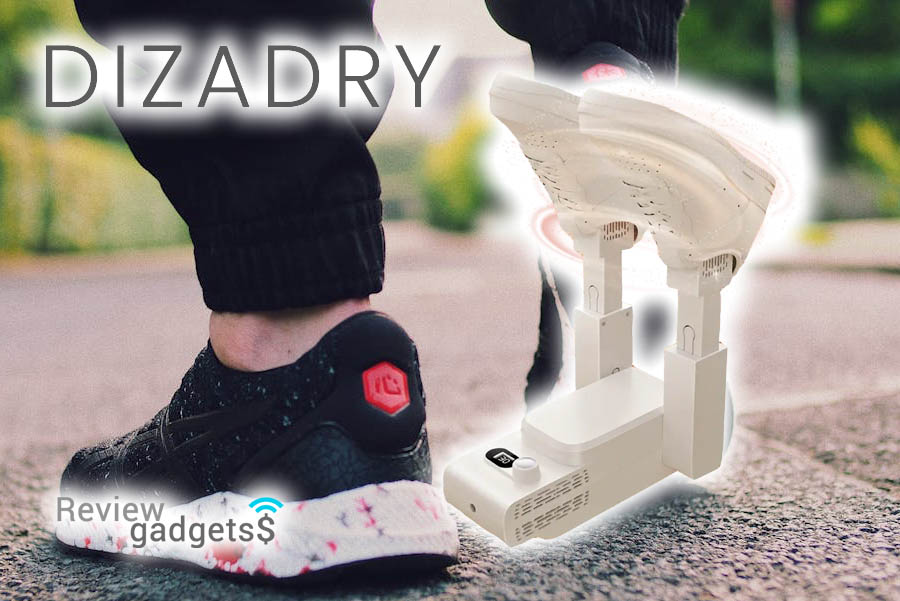When the temperatures drop and the rain makes an appearance, the story is always the same: soaked shoes, moisture inside the house, and radiators cranked up to full blast trying to dry them before your next outing. This year I tested the Qinux DizaDry, a foldable shoe dryer with a 200 W PTC heating element, programmable timer, and a promise to eliminate odors. After several weeks of intensive use—from running sneakers to ski boots—here’s how it held up.

Design and Materials: A Folding Minimalist That Fits Anywhere
The Qinux DizaDry arrives as two white ABS telescopic rods that open to a 90° angle. When extended, they reach 27 cm in length (enough even for mid-height boots), and when folded, they take up less space than a travel hairdryer. The 1.32 m cable felt a bit short if the outlet is far away, but I appreciate that the adapter includes a thermal fuse and flame-retardant casing.
Getting Started: Plug In, Set the Time, and Forget It
All you have to do is:
- Plug the unit into a 220 V outlet.
- Choose one of the time settings—30, 60, or 99 minutes—using the touch button.
- Insert each module into the toe of the shoe and let the air circulate.
The internal fan of the Qinux DizaDry blows a steady 42 °C airflow throughout the shoe thanks to its 360° curvature, eliminating cold spots. If the moisture is extreme—like ski boots that crossed a stream—I usually run two consecutive cycles.
Drying Performance: 8 h on a Radiator vs. 90 min with DizaDry
In my hands‑on test with a pair of mesh sneakers soaked with about 200 g of water, the Qinux DizaDry brought them to touch‑dry in 90 minutes. The “on the radiator” method at 1 000 W and 50 °C took nearly 8 hours and left the toe area noticeably cool. Air‑drying in January took over 24 hours.
The difference isn’t just about convenience: studies show that an internal microclimate at 96 % humidity promotes the growth of bacteria and fungi—especially Trichophyton—something quick drying can help prevent.

Power Consumption and Savings: Numbers That Convince
- DizaDry Power: 200 W
- Typical Run Time (2 × 60 min cycles) = 0.4 kWh
- Approximate Cost (EU average rate €0.288 /kWh) ≈ €0.12 European Commission
By comparison, running a 1 kW radiator for two hours (2 kWh) costs about €0.58—so over a season, homes with athletes or outdoor workers see real savings.
Extra Hygiene: Heat, Ozone, and UV Option
The manufacturer includes a UV‑C lamp and a low‑density ozone generator. It’s not a lab, but after five uses on soccer boots I noticed a marked drop in odor. The combined heat + ozone action hinders isovaleric acid–producing bacteria, a key culprit in “foot smell.”
Pros & Cons
The Good
- Dries even heavy footwear in 1–2 hours.
- Accurate timer, safe for overnight use.
- UV and ozone functions that really fight odors.
- Foldable and lightweight—fits in ski or gym bags.
Could Be Better
- Cable is a bit short; over 2 m would be ideal.
- No “cold air” mode—delicate leather needs monitoring.
- Only available online (for now) and limited stock during winter sales.
Price & Special Offers
Tired of waking up to cold feet or coming home to damp sneakers? The Qinux DizaDry is launching now at 50 % off with free shipping nationwide. For a limited time, you can get it for €79.95 instead of €159.90.
Activate Your 50 % Discount Here
How to Buy
- Check availability on the official website via this link.
- Choose how many Qinux DizaDrys you want (bulk packs reduce the per‑unit price).
- Enter your shipping and payment details to complete the purchase.
- Enjoy the limited‑time offer and have your new shoe dryer delivered to your door.
Purchase Guarantee
For your peace of mind, the Qinux DizaDry comes with a 30‑day satisfaction guarantee. If it doesn’t meet your expectations, you can request a full refund—no awkward questions asked.
Customer Reviews
With over 1,257 reviews and an average score of 4.7 out of 5 on TrustScore, the Qinux DizaDry has become the go‑to for anyone who needs fast, safe shoe drying. Athletes, busy families, and outdoor professionals praise its speed, low energy use, and the comfort of slipping into dry, warm footwear. Here are some standout opinions:
Philip Grant ★★★★☆ (4.6 / 5)
“I work as a courier in Manchester, so rain is part of my daily routine. I used to leave my boots by the radiator, yet they’d still be cold and smelly the next day. With the DizaDry, they’re dry in ninety minutes while I have dinner and watch a show. It uses very little power, is quiet, and even fits in my wellies. I’d dock half a star for the short cable, but overall it’s outstanding.”
Lauren Powell ★★★★☆ (4.7 / 5)
“I’m a mountain guide and spend days at remote refuges. Carrying the DizaDry in my pack has been a game‑changer: it weighs less than I expected and readies my technical boots for the next day. I love the timer—set it and forget it. I just wish it had a cool‑air mode for delicate linings.”

Rachel Martin ★★★★☆ (4.8 / 5)
“I have seven‑year‑old twins, so imagine the mud they track in. Since we started using the DizaDry, the battle over wet socks has disappeared. In 60 minutes, their trainers are dry and the odor… just vanishes! Plus, the warmth makes them actually put their shoes on without a fuss. My only gripe is I need another one for their gloves.”
Andrew Sullivan ★★★★☆ (4.9 / 5)
“I work at a ski resort and my boots suffer from chronic moisture. I tried industrial dryers, but they were either huge or scorched the liners. With the DizaDry, I have perfect boots in under two hours, and the UV system removes strong odors on the first pass. I’d love more temperature control, but it’s still the best gear purchase I’ve made.”
Activate Your 50 % Discount Here
Quick Market Comparison
| Product | Power | Timer | Foldable | RRP |
|---|---|---|---|---|
| Qinux DizaDry | 200 W | 30–99 min | Yes | €79.95 |
| DryGuy Force Dry | 240 W | 3 hr fixed | No | ~€65 + shipping/duties |
| PEET Power Cell | 13 W | No | No | €52 approx. |
The DryGuy packs more power but isn’t compact and lacks UV/ozone, while the PEET boasts ultra‑low consumption but takes over 6 hours to dry athletic shoes. Balancing speed, size, and extras, DizaDry holds a competitive edge.
Frequently Asked Questions (FAQ)
▸ Does it work with ski or motorcycle boots?
Yes. Its telescopic design reaches the toe of tall boots, and the 360° airflow covers the entire interior without deforming the shell.
▸ Is it noisy?
No. The internal fan stays below 25 dB, like a whisper. You can run it overnight without disturbance.
▸ How much electricity does it use?
At 200 W, two 60 min cycles cost around €0.12 on Spain’s average rate—less than running a radiator for half an hour.
▸ Is it safe to leave on while sleeping?
Yes. The automatic timer (30–60–99 min) and flame‑retardant housing shut off before any overheating occurs.
▸ Is it suitable for delicate materials like fine leather or suede?
We recommend the shortest setting (30 min) and checking the temperature halfway through. The warm airflow (~42 °C) removes moisture without harming the leather.
▸ Can I take it on international trips?
It runs on 220 V. For 110 V countries, you’ll need a converter. Its foldable format fits any carry‑on.
▸ Do I need chemicals to deodorize?
No. The built‑in heat, UV light, and ozone neutralize bacteria and odors naturally.
▸ Where do I get spare parts or support?
Official website parts include UV lamps and post‑sale service. Just provide your order number to open a ticket.
Turn every cold morning into a treat for your feet: the Qinux DizaDry awaits with 50 % off… before it’s gone!
Verdict: Small Investment, Huge Comfort
The Qinux DizaDry has gone from a curious gadget to an indispensable by the door. Its speed‑to‑power ratio makes it perfect for active families, athletes, or anyone who just hates cold feet. If you spend more on heating to dry boots each winter than on your morning coffee, €79.95 (shipping included) is more than justified.
My recommendation? Get one before the next storm hits—your feet (and electric bill) will thank you.






